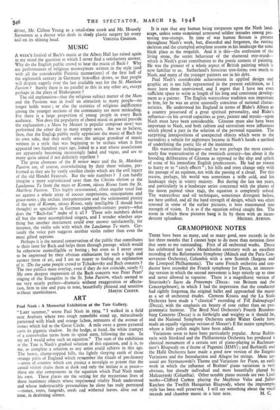GRAMOPHONE NOTES
THERE have been so, many, and so many good, new records in the last three months that I cannot hope to do more than mention those that seem to me outstanding. First of all orchestral works. Decca has celebrated last year's Mendelssohn centenary with an excellent recording of the Reformation Symphony (Munch and the Paris Con- servatoire Orchestra), Columbia with a new Scottish (Sargent and the Liverpool Philharmonic). The same French orchestra and con- ductor have recorded the Franck symphony for Decca, an interest- ing version in which the second movement is kept strictly up to time and never allowed to vaporise. There is a magnificent version of Stravinsky's- Sacre du Printemps (Decca: van Beinum and the Concertgebouw), in which I had the impression that the conductor had rightly forgotten' the original ballet and approached the music as a set of orchestral etudes. Clemens Krauss and the La Scala Orchestra have made a " classical " recording of Till Eulenspiegel (Decca), with the emphasis on beauty of tone rather than on pro- grammatic humour. The Boyd Neel Orchestra's Fourth Branden- burg Concerto (Decca) is as forthright and weighty as it should .be, and the National Symphony Orchestra under Walter Goehr have made an equally vigorous version of Mozart's E flat major symphony, where a little polish might have been added.
Variations seem to have been particularly popular. Artur Rubin- stein with Siisskind and the Philharmonia Orchestra has produced a classical monument of a certain sort of piano-playing in Rachman- inov's Rhapsody on sr theme of Paganini (HMV) ; and Barbirolli and the Halle Orchestra have made a good new version of the Enigma Variations and the Introduction and Allegro for strings. More un- usual are Szymanowski's Theme and Variations for Piano, an early work in which the influence of Brahms' piano variations is very obvious, but already' individual and most beautifully played by Malcuzynski (Colunibia). Other notable piano records are two Liszt works—Clifford Caton playing the Mephisto Valse and Julius Katchen the Twelfth Hungarian Rhapsody, where the impromptu style has been well preserved. I will say something about the vocal records and chamber music in a later note. M. C.






























 Previous page
Previous page